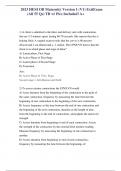Exam (elaborations)
2023 HESI OB Maternity Version 1 (V1) Exit Exam (All 55 Qs) TB w-Pics Included!! A+
- Course
- Institution
2023 HESI OB Maternity Version 1 (V1) Exit Exam (All 55 Qs) TB w-Pics Included!! A+1) A client is admitted to the labor and delivery unit with contractions that are 3-5 minutes apart, lasting 60-70 seconds. She reports that she is leaking fluid. A vaginal exam reveals that her cervix is 80 percent ...
[Show more]



